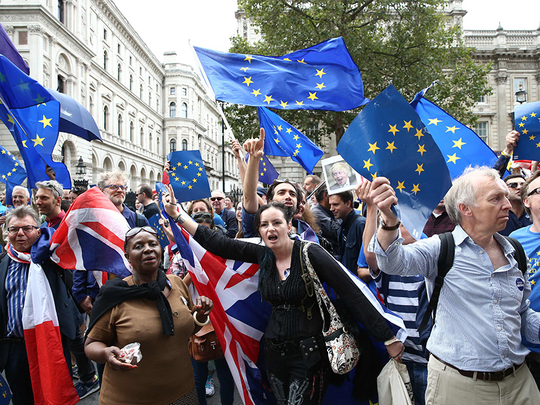
Brussels: The European Union has yet to set a date for a summit to respond to Britain’s notice of withdrawal but it should be between four and six weeks after March 29, the day when Britain will trigger Brexit, an EU source said on Monday.
Speaking after London announced that Prime Minister Theresa May would start the two-year withdrawal process by writing to EU summit chair Donald Tusk next Wednesday, the source said this did not leave enough time to convene the other 27 leaders on April 6-7, dates that had been pencilled in for a meeting.
EU officials have previously said that a notification just before May’s self-imposed end-March deadline could mean a summit in early May was the most likely timing.
Preparations may be slowed by holidays — around Easter on April 16 and on May 1. Brussels also wants to avoid clashing with the two-round French presidential election on April 23 and May 7. Officials say they would prefer to hold the summit before President Francois Hollande steps down around mid-May.
Tusk reiterated on Monday that he would send governments a draft of Brexit negotiating guidelines within 48 hours of May’s letter, which will set out Britain’s demands for the talks. The draft is broadly ready, based on what May said in a key speech in January, but may need to be fine-tuned, EU officials say.
The summit will endorse the final guidelines and mandate the EU’s negotiator, Michel Barnier from the European Commission. He will then send the Council his recommendations for how to run the negotiations. A Commission spokesman said on Monday Barnier would do this “immediately” after the summit.
Before negotiations with Britain can actually start, the Council, in the shape of ministers sitting in the General Affairs Council (GAC), must approve the recommendations by issuing legally binding “negotiating directives” to Barnier.
The European affairs ministers who sit on the GAC are due to meet in Brussels on May 16, although the body, currently chaired by the Maltese government, could convene at another date.
French Finance Minister Michel Sapin is relieved that negotiations about Britain’s departure from the 28-nation European Union will finally get under way next week.
Sapin says Monday: “At last. We’ve been waiting for the negotiations to get started since Brexit was voted” — a referendum to the UK vote last June.
He told reporters in Brussels that “it’s taken a long time ... but at last we are going to be able to get into the subject in detail.”
Sapin says he hopes the negotiations between Britain and the EU “can be done in a constructive manner, by both sides.”
German Chancellor Angela Merkel rejected the idea that Britain’s impending notification of its intention to leave the European Union will overshadow an upcoming summit to mark the 60th anniversary of the EU’s founding treaty.
The other EU leaders will meet in Rome on Saturday. Britain announced Monday that it will formally trigger the process of leaving the EU on March 29.
Merkel noted that British Prime Minister Theresa May always said that would happen before the end of March.
Merkel said “it makes absolutely no difference whether the notification comes one day earlier, or three or seven days afterward.”
She said that the focus in the coming years in Europe will be to work on Brexit and “how we can strengthen the cooperation of the 27” other EU members.












